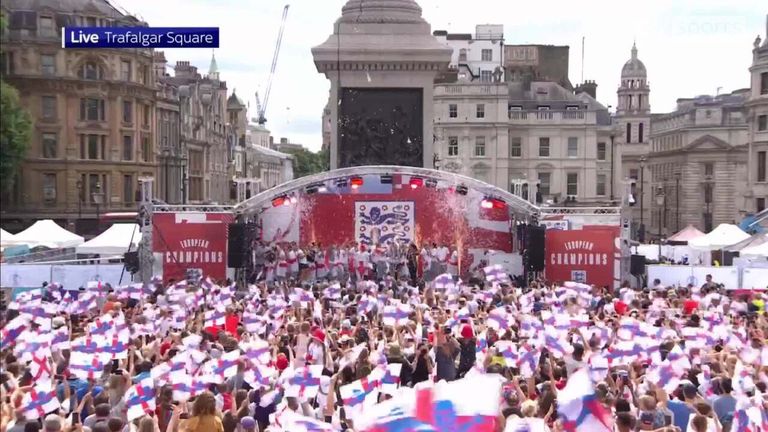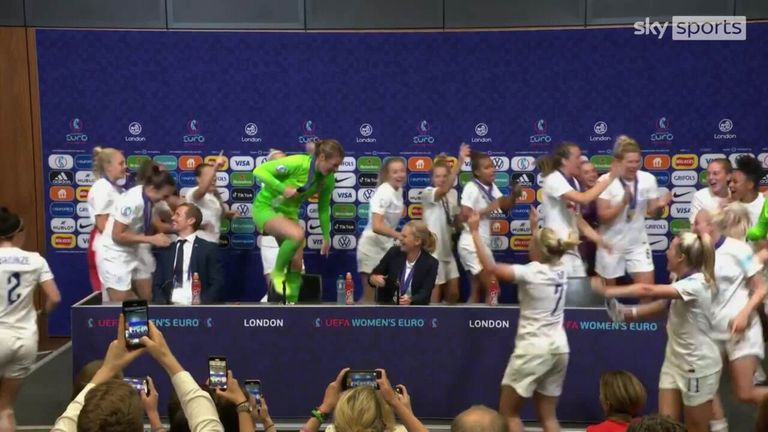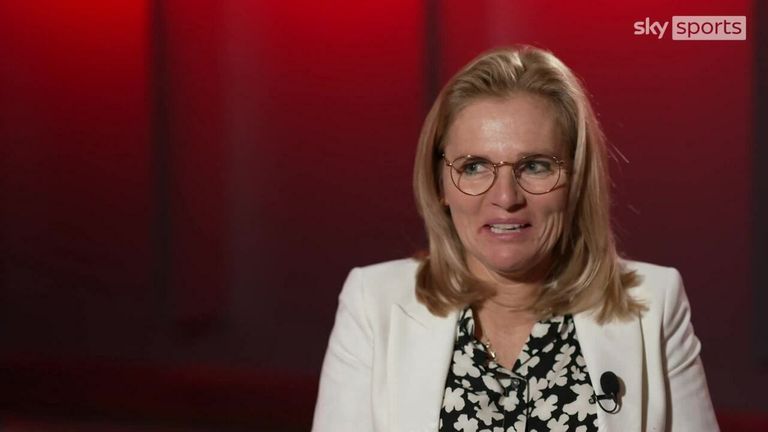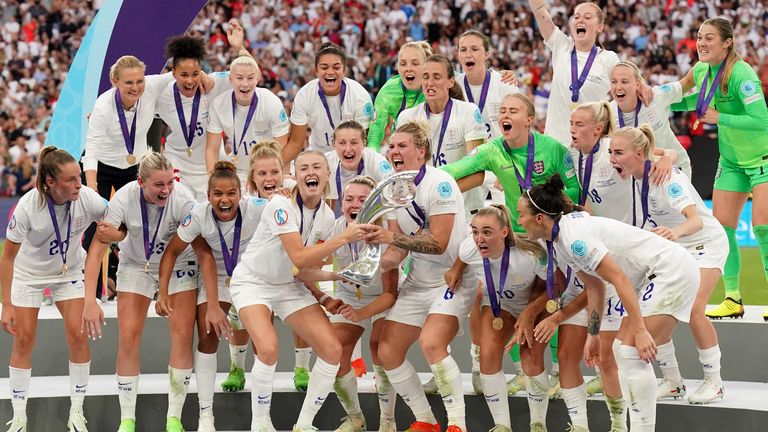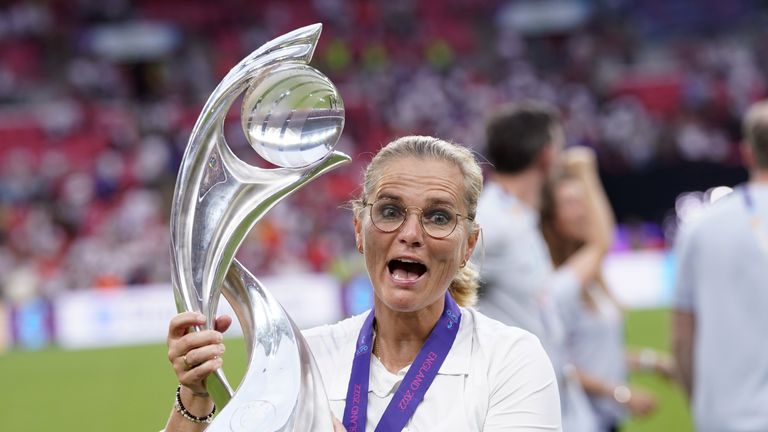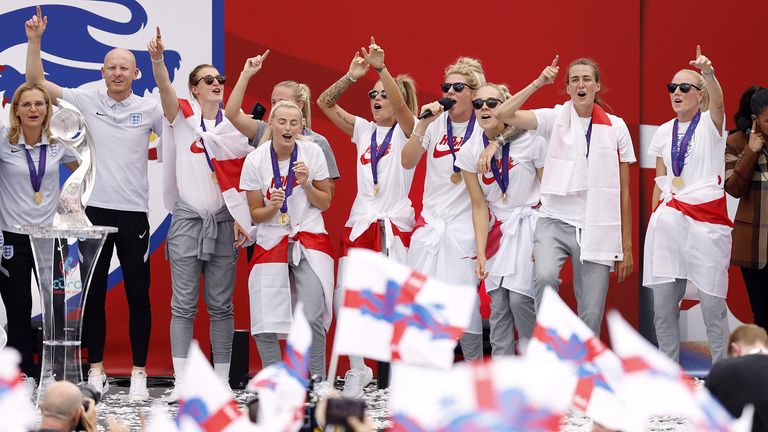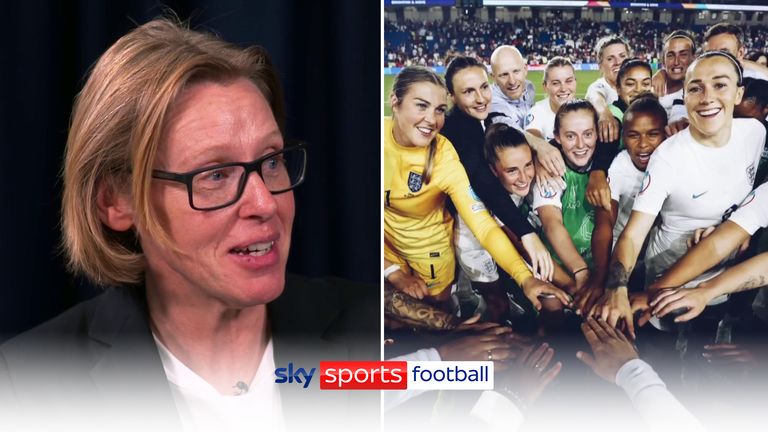[ad_1]
Five months since the Lionesses created history and won the Euros, Sarina Wiegman reflects on a summer that transformed women’s football.
Wiegman was described by captain Leah Williamson as the “missing ingredient” the Lionesses needed to win their first major tournament. What is the legacy of that famous victory so far? How has women’s football changed and what would winning the World Cup in 2023 mean? Sky Sports News spoke to the head coach of the England women’s team at the stadium where they created history.
England’s previous major trophy was at the 1966 World Cup, and for Wiegman, reflecting on the summer of success still feels surreal. “Incredible experience of course. Just a dream come true. So now it’s time to sit down a little bit and actually process the whole thing,” Wiegman told Sky Sports pundit and former Lioness Sue Smith at Wembley.
Wiegman is the first manager to lead two different nations to a European trophy having also triumphed with Netherlands in 2017, but are there any differences between winning in the Netherlands and winning in England?
“There is a difference,” Wiegman says in an extended interview. “First of all in the Netherlands the expectations weren’t as high as they were in England. And the chance of winning the Euros was really, really small. I think the impact in the Netherlands was high but here in England it’s so much higher.”
What about the impact on the Women’s Super League?
Wiegman, the first coach to win two consecutive Women’s Euros with two different countries, says: “That’s one of the best leagues in the world, but impacting the fans coming to the big stadium. So we had 40,000, 44,000, 30,000 people. That’s really incredible. So it reflects on both sides.”
“But also, what changed in society?” she asks. “Everyone is so proud of us, and you can feel it when they tell you. And that’s what we wanted – to make people proud of us. And we’ve been so inspirational to young kids and people.”
Earlier this summer, an open letter was signed by all 23 members of the England squad calling for the then Conservative Party leadership candidates Rishi Sunak and Liz Truss to give every girl in the nation the chance to follow in their footsteps and play football at school.
Wiegman adds: “I really, really like to see that the team has been so socially conscious. Writing the letter after the Euros and asking for access for every girl in football and at a younger age, and that’s still going on and that’s really good.”
In the interview Smith asks Wiegman: “Did you feel that pressure of things outside of football, not just focusing on the football itself?”
Wiegman says: “No, I didn’t feel that pressure. We just wanted to win the Euros. We just wanted to win every game. And yes, here you talk about football. You talk about a lot of other things going on in society that’s different than it was in the Netherlands.
“The players are so mature and they’re so conscious and they really want to make a difference and it’s so powerful. That’s another thing – I’m really proud of their personalities. They are good people.”
Utrecht turned orange in 2017 as Netherlands celebrated winning the Euros with the team parading on a canal boat. Five years later, Wiegman and the Lionesses proudly celebrated their win at Trafalgar Square. Does she have a favourite?
“That’s really hard to say,” she says. “I grew up in the Netherlands so I lived through the whole development of the game. I could never ever imagine that we could we go in a boat and see all these people. The same with Trafalgar Square. The whole history here and all these former players being so proud.
“So good to do that all together. We can all be so proud of that.”
Smith asks: “There are so many iconic moments looking back. Thinking of the eight goals against Norway, the Georgia Stanway screamer, the Alessia Russo cheeky backheel, the Chloe Kelly celebrations. What was your favourite or is it difficult to pick a favourite?”
Wiegman says: “I have many favourites from the tournament but one I pick out all the time is the Spain game.”
Leading up to the game, Wiegman contracted COVID-19 and was unsure whether or not she would be able to attend, but thankfully she was given the all-clear.
“This game [against Spain] was so intense, but everything was in this game, what we had been working on together from September last year until that moment. We said we wanted to stick with the plan. Everyone’s doing the role. Then the role has to be clear, keep working as a team, we worked on scenarios when we have to force a goal.
“And then Georgia had the shot in the transition moment. And I was like ‘wow’ against a country like Spain. Lots of countries they just drop back against Spain, but we tried to just press high.
“That’s what we saw in the World Cup too, you can play at your highest level and sometimes still lose because the other team is really good too. That’s what sticks with me because so many things, so many parts of the puzzle fell in and came together.”
One memorable moment was at Wiegman’s press conference, the pictures of goalkeeper Mary Earps dancing on the table with the squad singing ‘It’s coming home’.
Smith asks: “Have you learned the words to ‘It’s coming home?’ I won’t get you to sing it!”
“I’m a really poor singer, so you don’t want me to sing,” Wiegman laughs.
“I suppose that just showed the personality of the team and the sort of togetherness that you all had. I’ve obviously played for my country for a long period of time, and we had some great teams and we got to the final in 2009 but unfortunately got beaten by Germany. But I’ve never got my hands on a trophy.
“When you’re in that moment, you actually don’t realise. You don’t really realise until you sit down and reflect and then you’re like, ‘oh … what happened?’ But you move on too, because now we’re preparing for the World Cup, and we really want to do well.
“So you have that moment and we had to continue really quickly because after a month we already had to play Austria. It just went really quick.”
Smith asks Wiegman: “Has your life changed, are people stopping you on the street and asking for selfies?”
The 53-year-old admits: “It changed a little bit after the Euros in 2017. In England, everything is 10 times more, 10 times bigger. So yeah, people are proud, and they thank me a lot for what we have done this summer.”
Over 87,000 spectators attended the final at Wembley, a record for the tournament. One of the effects was the north London derby in September which saw over 47,000 fans, setting a new attendance record.
Smith adds: “The knock-on effect is obviously a 200 per cent increase in the WSL attendance. I remember playing for England making my debut, it was probably a couple of thousand people watching it.”
“Yeah, that was our generation,” Wiegman agrees. Smith adds: “Yeah, it was. And we were so used to that. Do you feel that you’ve changed the landscape of women’s football forever now?”
Wiegman says: “It’s a matter of time. My whole life and where we were, I was not allowed to play football, so I played illegally, and I didn’t have the examples of women that played football professionally or coaches, but now there are.
“It’s incredible to be part of and to see the growth of the game and where we are at now.”
She also mentions the difference five years on from the 2017 Euros.
“It’s technically harder and physically it’s a lot better in all elements. It has become better. It’s just really nice to be part of”, Wiegman says.
How did the head coach transform a team that had “so much potential to a team of winners?”
According to Wiegman: “I think this team already had all these winners. There’s so much potential, there’s so much quality and the fundament was there”.
“The last three big tournaments, the team made it until the semi-finals. That’s pretty good. But they did feel that they were sometimes maybe underperforming, although they really thought that they could do better and win.
“And what we noticed in September last year was that some players said and truly believed it, but some players said that, but they didn’t truly believe it yet. We thought, okay, then we have to build on that and we have to play games against big countries to show ourselves that we can do that.”
As a result of her conversations with the team, Wiegman mentions they played “not to win, but to prevent mistakes”.
“And we in encouraged the team all the time, that you have to take action and when you take action, you make mistakes because football is a game of making mistakes. In life, you make mistakes. And then of course we did so many things off pitch and on the pitch and using the expertise of all the staff members, clarity about the style of play, how we treat each other.
She adds: “You should be able to be yourself, express yourself and be accepted. We really worked on that and it’s all about connecting, communication and collaboration and being open and honest and treating each other well. And that helped.”
The landscape of women’s football has changed over the years but how does she think it’s changed? Wiegman has a clear idea.
She says: “Women’s football has changed so much, the level! The level of the game increased so much, but also so many things around besides football. So my role changed a lot too.
“When I started, basically I did everything myself because you didn’t have all the people around. And now [on her role and how the game has developed], it’s shifted a little bit to a more manager role, but the technical staff are so, so good. So we really have a big good collaboration that you split responsibilities.”
Wiegman is Dutch and Smith asks her about the debate over the nationality of the England coach.
“The men’s World Cup has finished. And there’s a lot of talk about English managers managing England. The manager that’s actually brought success is from the Netherlands. Do you think that you have to be English to manage the England national team?” Smith asks.
“Obviously, I don’t think so”, Wiegman replies. “I think what England look for with the women’s team is the right person at the right moments. And then we got in conversation [speaking about how she got the job], they were convinced that I was the best fit for this team at this moment with what I can bring.”
Wiegman also says she tried to “really get into the culture”.
She says: “Although England and the Netherlands is pretty close to each other. But of course we do have some cultural differences. So I’m trying to learn about that and add some things in the game and add myself in it. And for now, that’s a very good fit and everyone’s happy and hopefully that stays there.”
The Women’s World Cup will be held next July in Australia and New Zealand and it will be the first co-hosted event in the tournament’s history.
Smith asks if there is added pressure because they are now European champions, but Wiegman says it is not a big issue.
She says: “The pressure was there anyway. When I came in, I had all the questions, ‘Are you going to bring it home or are you going to do this? Are we finally going to win the tournament now?’ Those are the expectations, that’s the environment I work in.
“I hope things go well. And I do my very best. I give my everything. And when it’s not enough, it’s very disappointing. But I know I’ve done everything. And so the players and so the staff will.
“It’s so tight you can play your very best game and still not win because sometimes you need a little luck. And so, with luck, you need the best preparation you can control. What you can control. You need to do the best. You make the chances as high as possible.”
The squad has a mix of experience between older and younger players coming through but how important is that blend for Wiegman?
The two-time Euros-winning coach says: “If you just perform at the highest level, your age doesn’t really matter. Like the experience of Ellen (White) and Jill (Scott), they can share stories with players who haven’t experienced that yet.
“That’s really really important. But it starts actually really with how good you are, what quality you bring to the team. And yes we had a very good mixture, but just the way it worked out with the talented young players and the experience. Very talented, all the players.”
Smith asks: “And you’re obviously a World Cup runner up. What would it mean to win the World Cup with England?”
“It would mean so much,” says the woman aiming to make more history with the Lionesses.
“What we did this summer, you could see there was so much togetherness, so much willingness to win, so much energy in the team, the style of play, that’s what helps.
“So the impact of really winning is huge, but making it far in the tournament already will have an impact.
“That doesn’t mean that I don’t want to win!”
[ad_2]
Source link
